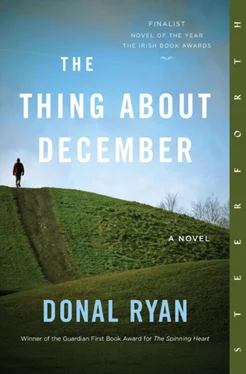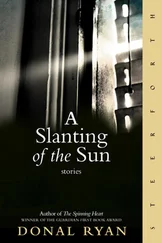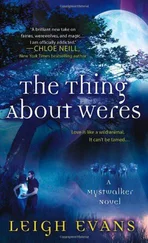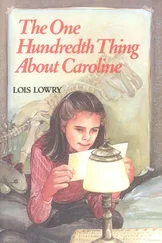They never stopped and came in. Not into the co-op. Sure why would they? Maybe the Spar below did better in the foreigner stakes.
MOTHER DIDN’T really listen to his answers to her fired-off questions any more. She hardly heard her own questions. She asked them in a listing way that reminded Johnsey of the whole class reeling off the times tables in school years ago. He could have said Sure it was a grand day, Mother, I planted an axe in Packie’s forehead, took all the co-op money, went off in the jeep and drove over Eugene Penrose and all the dole boys, killed them all dead, and now that I have the supper ate, I’m off to town to be a cool bigshot and get off with girls. She would probably just stay folding clothes and tightening up and nodding and not seeing him and not hearing him. Good luck so.
He went out in the yard to practise driving. Mother’s old Fiesta was going grand, and she let him drive it over and back across the yard. She wouldn’t insure him on it, though. Insurance for lads like you now is about twenty thousand pounds, Johnsey. Twenty thousand? Would they know he was thick? Was that one of the questions they asked? Yes, Mister Cunliffe, hmm … seeing as you’re a bit of a spastic … (there would be clicks of computer keys and sighs of impatience) … it’ll be twenty thousand million billion pounds for basic insurance on that clapped-out heap of old shite. Okay? So stick to your laps of the front yard. All right? You fat gom. Click .
He thought better of the driving practice. Mother was complaining the other day about the price of fuel, and anyway it was only a frustration that he couldn’t keep going past the gate and roar off down the road. He considered walking up through the long acre and down the river field to the stream. There was something satisfying about the crunching noise your boots made when you walked through grass that was decorated by frost. There was a spot down there by the stream on a rise above the little beach of muck formed by the thirsty cattle, under the weeping willow where you could sit, surrounded by light-green branches, where no one could see you. If you sat still enough you could imagine you were a tree too. No one ever called a tree a spastic or tried to trip it or gave out stink to it for stacking things wrong. Daddy said all life depends on trees. They make the air we breathe.
He was nearly over the stile when he thought of Dermot McDermott, and changed his mind. He was leasing the farm but you’d swear he owned the place, the swagger of him. When Johnsey met him on the land, it was as if he, Johnsey, were a trespasser. He’d ask where was he off to, and he’d never call him Johnsey, only always John. He was too cool for auld peata names. And he’d consider Johnsey with a quick up and down of his slitted eyes and a bit of a smirk. He’d be probably thinking Look at this ape, his father dies and he can’t manage the bit of a farm that’s left behind! I’m here driving my big tractor over his birthright! What a waster!
Mother says people who give their sons names like Dermot McDermott are up their own arses. As much as to say we’re the real McDermotts and our boy is Dermot, son of Dermot, descended directly from the High Kings. Thinking they’re two cuts above the hi-pull-eye and one cut at least above their neighbours. Mother says the hi-pull-eye is the people who live in the council houses outside the village on the end of the Ashdown Road. They nearly all have mongrel dogs and loads of children. Or loads of dogs and mongrel children, Johnsey wasn’t sure which Mother said.
THE LOCK on the door of the slatted house was broken and the wood was warped from dampness and rot, so the door was stuck half open. Even after three years it was strange to have the slatted house empty in January. The cattle made their beds in there every winter; they’d be cosy and warm and safe from the cold rain and the stinging frost, all squashed in together and using each other as big radiators. And their shite would flow away down a pipe all winter and into an underground tank to be sucked back up and spread on the land to feed the grass that they would eat and turn back into milk and shite again. Whenever the teacher would describe the Nativity in school, Johnsey always pictured the stable in Bethlehem as the slatted house that neatly divided the front yard from the big yard, and the three wise men as Daddy, Paddy Rourke and Mister Unthank. The baby Jesus would have been fine and warm and safe in there.
There was enough light allowed in so that Johnsey could see the stout crossbeam that dissected the roof. Would it take his weight? Things was built right in them days, Daddy always said. He was very fat, though. Imagine if he did it arseways and fell on his hole and broke his leg! And Dermot McDermott found him, say. And called Mother. And the fire brigade. And Father Cotter. And then Eugene Penrose and the rest of the dole boys would arrive on after seeing the brigade flying out. The whole village would be standing in the yard for a finish, waiting for a turn to look in the door at the fat eejit on the floor of the slatted house with his leg bursted and cocked at a quare angle, crying like a small child, his face purple and swelled and the rope still tight around his neck, and they’d point and shake their heads and roll their eyes until someone kind would break it up and push them away and try to help him, and their kindness would stab him deeper than the laughter of the rest, because he didn’t deserve it, and they’d know it, but be kind anyway.
Father Cotter was that way, and the Unthanks. Packie Collins wasn’t. He told Johnsey every day that he was only allowing him work in the co-op out of respect for his father, Lord have mercy on him. He was a liability . Johnsey often heard Packie muttering about him to customers, who’d look around and smirk, and if he caught their eye they’d salute him, but in a way that was too friendly, as fake as that cake in the window of the wedding shop inside in town. As fake as a three-pound note, Mother would say. Father Cotter’s job was to be nice to people; he worked for God, who gave strict instructions to all to be good and nice. And Mister Unthank was Daddy’s great old friend; they’d palled around together since they were small boys. He’d stood at Daddy’s coffin for ages in the funeral home, with his hand on the rim, just shaking his head and saying, really softly, Jack, Jack, Jackie , and tut-tutting, like Daddy used to over things being wasted and things that weren’t right, and Johnsey saw a tear rolling off of Mister Unthank’s chin and landing on his father’s cheek, so that it looked like Daddy himself was crying.
DADDY HAD ALWAYS SAID to be honest. Daddy wasn’t able to tell a lie. Once, years ago, an auld biddy from the village rang to know would Mother be able to bake twenty tarts in a hurry for the ICA show and Daddy told them hold on and put down the phone and went out to the chicken coop in the haggard to ask her and Mother said to tell that old biddy make her own tarts, no, tell her I’m gone to town and won’t be back till nine but Daddy said No, Sarah. You know I can’t tell a lie. And the way he said it, it was like the priest saying and the Word was made flesh : it was a fact, a given thing; there could be no argument. Mother stomped into the hallway, raging, and had to tell her own lie. Then she told Daddy that now he had her feeling terrible and she had to go as far as town for a finish so as to make her lie into truth, and stay there until nine o’clock to make doubly certain that truth prevailed that day. That was one of the things about Daddy: he could make you feel bad by being so good, so that you had to try to be good like him.
He couldn’t think properly abroad in the yard or around the buildings or even in the dark of the slatted house. The whole place smelled of Daddy. Whenever he looked up the yard he expected to see him striding towards him, saluting with his stick and full of news even when there was no news. Everything in the yard seemed to have died with him, as though they had only existed to serve him. But still all these things were shaped by his weight and worn by his touch so that no one else could quite fit them: the rut along the yard where he had tramped the same track over and over every day where visitors often stumbled, unaware of its presence until its sides caught their soles; the shiny, paintless edges around the handles of the doors to the slatted house and the milking parlour and the workshop where every day for years on end he had flung them open and closed; the seats of the tractor and the jeep, moulded by the burden of him into a hollow; the very walls of the buildings that seemed to stand now only to honour the memory of his stony strength.
Читать дальше











